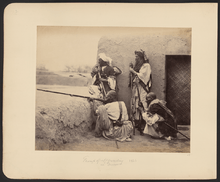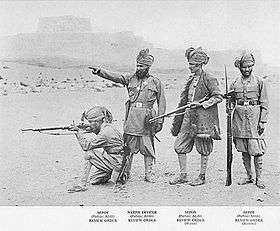Afridi
| [1] | |
| Languages | |
|---|---|
|
Vernacular: Pashto Diaspora: Urdu | |
| Religion | |
| Sunni Islam | |
| Related ethnic groups | |
|
Khattaks · Orakzais · Wazirs · Mehsuds and other Karlani Pashtun tribes |

The Afridi (Pashto: اپريدی Apriday, plur. اپريدي Afridi; Urdu: آفریدی) is a Karlani Pashtun tribe present in Pakistan, with substantial numbers in Afghanistan. The Afridis are most dominant in Pakistan's Federally Administered Tribal Areas, inhabiting about 100p mi² (3000 km²) of rough hilly area in the eastern Spin Ghar range west of Peshawar, covering most of Khyber Agency, FR Peshawar and FR Kohat.[2] Their territory includes the Khyber Pass and Maidan in Tirah. Afridi migrants are also found in India, mostly in the states of Uttar Pradesh, Bihar and Jammu and Kashmir.[3]
The Afridis are historically known for the strategic location they inhabit and their belligerence against outside forces; battling the Mughal dynasty's armies throughout Mughal rule.[1] The later clashes against British expeditions comprised the most savage fighting of the Anglo-Afghan Wars.[4]
After the independence of Pakistan, Afridi tribesmen also helped attack Jammu and Kashmir for Pakistan during the Indo-Pakistani war of 1947.[5] Today, Afridis make use of their dominant social position in FATA and areas of Khyber Pakhtunkhwa by controlling transport and various businesses, including trade in arms, munitions, and other goods.[1]
The Afridi are Pashtuns, part of the Karlani tribal confederacy, who fought both against and with the British in Afghanistan during all three Anglo-Afghan wars. The British frequently classified the peoples that they conquered with fixed personality or “racial” traits and regarded the Pashtun Afridi tribesmen as “warlike” peoples and one of the Martial Race. Different Afridi clans cooperated with the British forces in exchange for subsidies, and some even served with the Khyber Rifles, an auxiliary force of the British Indian Army.[6]
Afridis speak the Afridi Pashto.
Etymology and origins
The Afridis, classically called the Abaörteans (/ˌæbə.ɔːrˈtiːənz/; Latin: Abaortae), have their original homeland in the Spin Ghar, a mountain range on both sides of the Durand line, located east of Kabul and west of Peshawar. The Sanskrit grammarian and historian Pāṇini, who himself hailed from the nearby Shalatur, a village located near the confluence of the Kabul and Indus rivers, mentioned the names of tribes such as the Aprits (identified with the modern Afridis) and the Madhumants (identified with modern Mohmands) who inhabited the northwestern areas, in his Ashtadhyayi in the 5th century BC.[7]
According to Pashtun folklore, the Afridi tribe traces its origin back to the eponymous ancestor of all Pashtuns, Qais Abdur Rashid, through his youngest son, Karlan. Thus, the Afridi tribe are one of the Karlani tribes, who had a formidable reputation as warriors. In fact, the great Pushtun tribe Burki is the sub-caste of it.
A tribe of ancient Pashtuns
Herodotus mentions a tribe of the Pactyans as Aparytai (Ἀπαρύται).[8] Scholars Grierson, Stein and Olaf Caroe equate these with modern Afridis on the basis of linguistic and geographic analysis.[9]
Theory of Afridi descent from Israelites
The Afridis and other Pashtuns of Afghanistan and Pakistan have also been alleged to be the descendants of the lost Jewish tribes such as the Efraim. However, DNA and other research towards validating such claims has been inconclusive.[10][11][12]
Clans
The British classified the Afridi in nine different clans, with many subtribes in a hierarchical structure:[13]
- Kuki Khel
- Malik din Khel
- Qambar Khel
- Kamar Khel
- Zakha Khel
- Sarmast Khel
- Aka Khel
- Sepáh
- Adam Khel
All Afridi clans have their own areas in the Tirah Valley, and most of them extend down into the Khyber Pass over which they have always exercised the right of toll. The Malikdin Khel live in the centre of the Tirah and hold Bagh, the traditional meeting place of Afridi jirgas or assemblies. The Aka Khel are scattered in the hills south of Jamrud. All of this area is included in the Khyber Agency. The Adam Khel live in the hills between Peshawar and Kohat. The Burki live in Kanigoram Valley, Waziristan and Peshawar. Their preserve is the Kohat Pass in which several of the most important Afridi gun factories are located.
Religion
All modern Afridis follow Islam. Their conversion to Islam is attributed to Sultan (Emperor) Mahmud of Ghazni by sources such as Ibbetson[14] and Haroon Rashid.[15]
History
Resistance against the Mughals
The Afridis and their allies Khalils were first mentioned in the memoirs of Mughal Emperor Babar as violent tribes in need of subduing.[16] The Afridi tribes controlled the Khyber Pass, which has served as a corridor connecting the Indian subcontinent with Afghanistan and Central Asia. Its strategic value was not lost on the Mughals to whom the Afridis were implacably hostile.[17]
Over the course of Mughal rule, Emperors Akbar and Jahangir both dispatched punitive expeditions to suppress the Afridis, to little success.[18]
The Afridis once destroyed two large Mughal armies of Emperor Aurangzeb: in 1672, in a surprise attack between Peshawar and Kabul, and in the winter of 1673, in an ambush in the mountain passes.[19] The emperor himself had to lead an army into the mountains to suffocate the revolt and liberate the mountain passes and even then, another large army was "badly mauled" in Bajaur.[19][20]
Allegedly, only five Mughals made it out of the battle alive.[21][22][23]
Resistance against the British


The British connection with the Adam Khel Afridis commenced immediately after the annexation of the Peshawar and Kohat districts. Following the example of all theprevious rulers, the British agreed to pay the tribe a subsidy to protect the pass. However, in 1850, 100p Afridis attacked a body of British sappers engaged in making a road, killing 12 and wounding 6. It was supposed that they disliked the construction of a road. An expedition of 3200 British troops was despatched, which traversed the country and punished them.
When the Afridis of the Kohat Pass resisted, the Jowaki Afridis offered the use of their route instead; but they turned out more aggressive than the others, and in 1853, a force of 1700 British traversed their country and destroyed their stronghold at Bori.
In 1854, the Aka Khels Afridis, not finding themselves admitted to a share of the allowances of the Kohat Pass, commenced a series of raids on the Peshawar border and attacked a British camp. An expedition of 1500 troops entered the country and inflicted severe punishment on the tribe, who made their submission and paid a fine.
In 1877, the British government proposed to reduce the Jowaki allowance for guarding the Kohat Pass, and the tribesmen showed their resentment of this by cutting the telegraph wire and raiding into British territory. A force of 1500 troops penetrated their country in three columns in the Jowaki Expedition and did considerable damage by way of punishment. However, the attitude of the Jowakis continued the same, and their raids into British territory went on. A much stronger force, therefore, of 7400 British troops, divided into three columns, in 1877 and 1878, destroyed their principal villages and occupied their country for some time, until the tribe submitted and accepted government terms. The Kohat Pass was afterwards practically undisturbed.
At the time of the British advance into Afghanistan in 1878, during the Second Afghan War, the Zakka Khel opposed the British advance and attacked their outposts. A force of 2500 British troops traversed their country, and the tribesmen made their submission. The Afridis of the Khyber Pass continued to cause the British trouble during the progress of the Second Afghan War so another force of 3750 British troops traversed their country, and after suffering some loss the tribesmen made their submission.
In 1897, Afridis suddenly rose, captured all the posts in the Khyber held by their own countrymen and attacked the forts on the Samana Range near the city of Peshawar. The Tirah Expedition of the British forces followed, and negotiations for peace were then begun with the Afridis, who, under the threat of another expedition into Tirah in spring 1898, at length agreed to pay the fines and surrender the rifles demanded.
In February 1908, the restiveness of the Zakka Khel again made a British expedition necessary, but the campaign was speedily ended.
Cuisine
Meat is an important part of their diet, which they often eat in the form of kabab (minced meat fried in oil), lamb curry, chicken curry or goat curry. The hotels in Peshawar Namak Mandi Bazar represent the traditional food of Afridis, especially lamb karahi. In vegetable cuisine, traditional Indian Ingredients such as bindi (okra), rajma (kidney beans), dal (lentils) and sag (spinach) are notably eaten.
List of notable Afridis
(Please only add names of those people who already have existing Wikipedia articles. Other names will be removed)

Khushdil Khan, Lieutenant General Khushdil Khan Afridi served as the Governor of Balochistan, Pakistan from 18 November 1984 to 30 December 1985
- Sher Ali Afridi, a former policeman from Peshawar who assassinated Lord Mayo, the Viceroy of British India, in 1872.[24]
- Meraj Muhammad Khan, a founding member of Pakistan Peoples Party who is originally from Maidan (Tirah), and comes from a Zakha Khel Afridi family.
- Haji Baz Gul Afridi, Former member of the National Assembly of Pakistan from Darra Adam Khel.
- Malik Mehrun Nisa Afridi, twice member of the National Assembly of Pakistan from Pakistan Peoples Party.
- Josh Malihabadi, British India-born Urdu poet and recipient of the Padma Bhushan, who emigrated from India to Pakistan in 1958.
- Mahmud Hussain, Pakistani academic, Minister for Education, and Vice-Chancellor of Dhaka University and Karachi University.
- Masud Husain Khan, eminent linguist and the 5th Vice Chancellor of Jamia Millia Islamia, New Delhi.
- Rahimuddin Khan, Pakistani general, military Governor of Balochistan (1978–1984) and Governor of Sindh (1988).[25]
- Shahid Afridi, Pakistani cricketer and former national captain, and was the world record-holder for the fastest century in One Day International cricket, until Corey Anderson, a New Zealand cricketer broke the former's record by hitting a 36 ball century against West Indies, and which again was broken by AB de Villiers of South Africa in 2015.[26] He still holds the record for the most sixes hit in ODI cricket history.[27]
Khatir Afridi (Pashto poet)
See also
References
- 1 2 3 Afridi demographics in Pakistan and Afghanistan The excessive figure sometimes mentioned in Afghanistan reflects in a particular way the Afghan claim to Pashtunistan and actually represents an estimate of the whole of the Afridi tribe on both sides of the frontier.
- ↑ Afridi demographics in FATA and FR Kohat
- ↑ Study of the Pathan Communities in Four States of India, Khyber.org (retrieved 30 January 2008)
- ↑ L. Thomas, Beyond Khyber Pass, London, n.d. (ca. 1925)
- ↑ M.K. Teng (2001) Kashmir: The Bitter Truth Archived 26 August 2011 at the Wayback Machine. Kashmir Information Network
- ↑ Library of Congress
- ↑ page 64 India and Central Asia By J. N. Roy, J.N. Roy And B.B. Kumar, Astha Bharati (Organization), Indian Council for Cultural Relations
- ↑ "The History of Herodotus Chapter 3, Verse 91; Written 440 B.C.E, Translated by G. C. Macaulay". sacred-texts.com. Retrieved 2015-02-21.
- ↑ Caroe, Olaf (1957). The Pathans. Oxford University Press. p. 37. ISBN 0-19-577221-0.
- ↑ Amir Mizroch (9 January 2010). "Are Taliban descendants of Israelites?". The Jerusalem Post. Archived from the original on 16 June 2011.
- ↑ Sachin Parashar (11 January 2010). "Lucknow Pathans have Jewish roots?". Times of India.
- ↑ Rory McCarthy (17 January 2010). "Pashtun clue to lost tribes of Israel". The Observer.
- ↑ H.A. Rose; IBBETSON, Maclagan (1996). Glossary of the Tribes and Castes of the Punjab and North West Frontier Province (re-edition, first edited in 1919, 1911,1914 ed.). Asian Educational Services. pp. 252–253. ISBN 978-81-206-0505-3.
- ↑ Denzil Ibbetson, Edward MacLagan, H.A. Rose "A Glossary of The Tribes & Casts of The Punjab & North-West Frontier Province", 1911 AD, Page 217, Vol III,Published by Asian Educational Services
- ↑ History of the Pathans By Haroon Rashid Published by Haroon Rashid, 2002 Item notes: v. 1 Page 45 Original from the University of Michigan
- ↑ A. S. Beveridge, Babor-nama London, 1922 [repr. 1969], p. 412
- ↑ History of Khyber Agency: Gateway to the Subcontinent, Office of the Political Agent, Khyber Agency
- ↑ C.M. Kieffer, Afridi, Encyclopaedia Iranica
- 1 2 Richards, John F. (1996), "Imperial expansion under Aurangzeb 1658–1869. Testing the limits of the empire: the Northwest.", The Mughal Empire, New Cambridge history of India: The Mughals and their contemporaries, 5 (illustrated, reprint ed.), Cambridge University Press, pp. 170–171, ISBN 978-0-521-56603-2
- ↑ Khyber Agency Khyber.org, 3 July 2005
- ↑ Geoffrey Powell; J. S. W. Powell (1983), Famous regiments (illustrated ed.), Secker & Warburg, p. 69, ISBN 978-0-436-37910-9
- ↑ Robert E. L. Masters; Eduard Lea (1963). Perverse crimes in history: evolving concepts of sadism, lust-murder, and necrophilia from ancient to modern times. Julian Press. p. 211. Retrieved 5 April 2011.
- ↑ Robert E. L. Masters; Eduard Lea (1963). Sex crimes in history: evolving concepts of sadism, lust-murder, and necrophilia, from ancient to modern times. Julian Press. p. 211. Retrieved 5 April 2011.
- ↑ Helen Ellis (July 2009) The Assassination of Lord Mayo: The 'First' Jihad? Australian National University
- ↑ Foreign Policy Centre (2006), On the Margins of History: The Baloch of Pakistan
- ↑ ODI Records:- Fastest 100s
- ↑ Yuvraj Singh vs Shahid Afridi | Who's The Greatest?
External
links
| Wikisource has the text of the 1911 Encyclopædia Britannica article Afridi. |